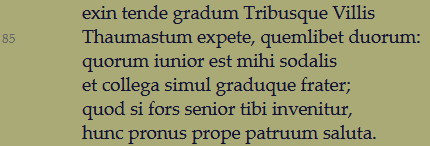Filomena Giannotti investigates the thorny question whether Thaumastus was Sidonius’ uncle or his cousin in ‘Pronus prope o prope patruum? Nota sul Propempticon ad libellum di Sidonio Apollinare (c. 24,84-89)’, BSL 51 (2021) 169-77.
Abstract. As the penultimate stage of his Propempticon ad libellum Sidonius Apollinaris imagines that his nugae arrive at Tres Villae, where the two Thaumastus, father and son, live (carm. 24,84-89). Together with Apollinaris and Simplicius, Thaumastus has traditionally been identified as Sidonius’ paternal uncle, but Ralph W. Mathisen has recently suggested that they were the paternal cousins and coevals of Sidonius. Even though really deserving, this suggestion is based on some doubtful points, which are analyzed here individually, with reference to some passages of Sidonius’ letters (epist. 3,12,5 lines 1-2; 3,11; 5,4,2; 5,6,1; 5,3,1) and in particular to the verse hunc pronus prope patruum saluta (carm. 24,89). As regards this verse, the new exegetic hypothesis of this paper is that prope is not related to patruum, but to pronus, through an anastrophe, like in some other cases in Sidonius. From a semantic point of view, the awkward interpretation “almost a paternal uncle”, on which Mathisen bases his thesis that Thaumastus was not Sidonius’ patruus but the husband of Sidonius’ aunt, would be replaced by the interpretation “almost prone in a bow”. This would seem to be more in line with the playful personification of the libellus and confirm the traditional theory about the relationship between Sidonius and Thaumastus.

